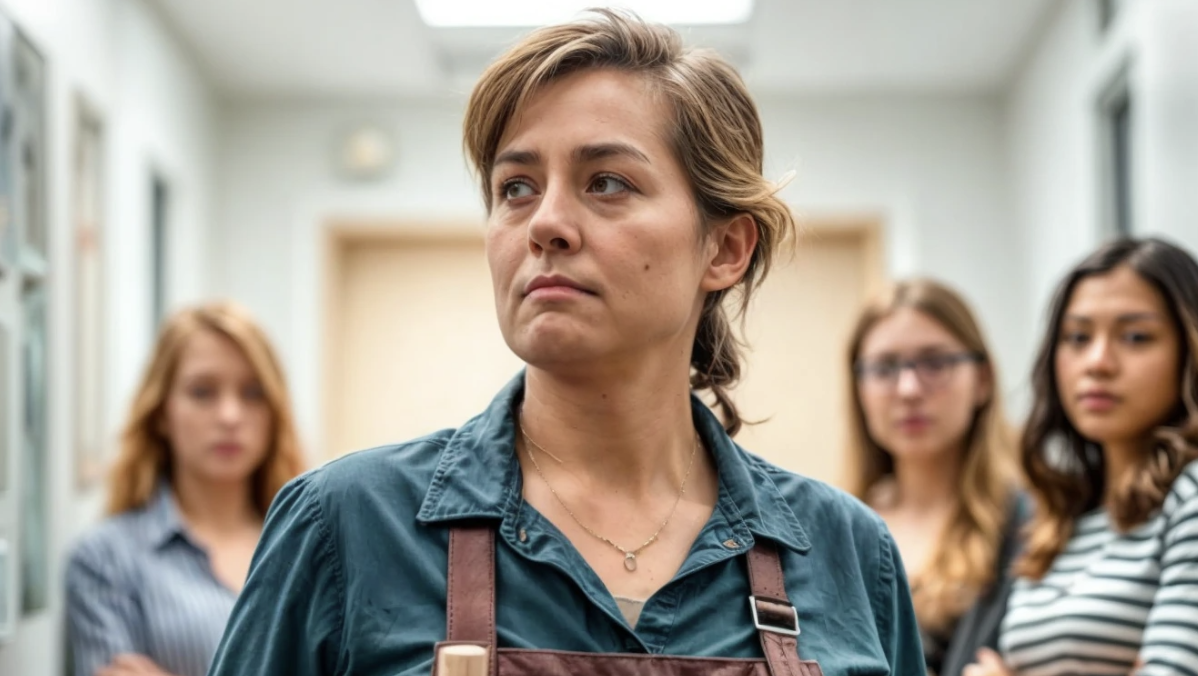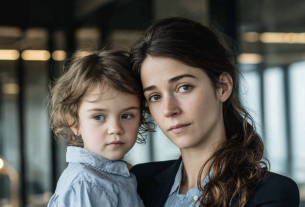The office door slammed open with a deafening crash, hitting the wall so hard that the freshly painted surface immediately dented ugly. In the doorway stood the director like a thundercloud — Arkady Sergeyevich Glebov. His face was flushed a deep crimson, and a blue vein bulged on his forehead, pulsing with rage. His eyes, burning with an unfriendly fire, darted around the room where the female employees, holding their breath, froze in anticipation of the storm.
“All of you, every single one!” he roared, clenching his fists until the knuckles whitened. “You’ll all go sweep the entire yard! You lazybones!”
Turning sharply on his heels, he slammed the door with such fury that the glass in the partitions trembled, nearly flying out of their frames. Once inside his office, Arkady Sergeyevich plopped down into his chair, overcome by a familiar feeling of helplessness. The company, inherited from his cousin, was falling apart before his eyes like a rotten ship. He, a philologist by education and an accidental businessman by fate, felt like a complete failure — not just in business but in life. Every day was a battle he invariably lost.
There was a quiet but persistent knock at the door. Evgenia Nikolaevna Kornilova, the chief accountant, entered — a woman with an icy gaze and steely composure.
“Arkady Sergeyevich, this can’t go on,” her voice was even but carried a clear reproach. “The office is turning into a dump. Soon, rats will come. There’s no money for cleaning, you know that. If you continue like this, there won’t be anything left even for salaries.”
Arkady wearily ran his hand over his face, feeling a dull pain squeezing his temples. In two weeks, his vacation would begin — two weeks of blissful oblivion on the Turkish coast. He would run away there right now if not for the hundreds of small, sticky problems holding him like a spiderweb in this stuffy, joyless office.
That evening, burying his face in his phone, Arkady poured out his soul to his friend Marina Stepanova. Her laugh, always slightly sarcastic, jingled over the line like a bell, highlighting his helplessness.
“Your lazy girls giving you trouble again?” she drawled, clearly enjoying his irritation. “And that cleaning lady, that old ‘god’s dandelion’ you kicked out yourself.”
“I didn’t kick her out!” he snapped. “She just declared her workday over when I asked her to clean the office after the meeting!”
Marina snorted.
“Well, then hire a new one. But not just any cleaner — a kick-ass cleaner!” Her voice played with mischievous tones. “With character, you know? Like a prison warden. So that when she shows up, everyone stands at attention and starts working. Someone who’ll bring order here once and for all!”
Arkady frowned, but the idea stuck in his mind. The team had long turned into a tangled snake pit of intrigues. Recently, he had to fire the HR officer Svetlana — she not only caused a scandal with half the department but slapped him right in the hallway, then lied to Marina saying he had harassed her. The investigations were humiliating. And her friend Alexandra Grebenshchikova now looked at him with silent hatred.
“I need something radical so they sit quietly,” Arkady thought as he said goodbye to Marina. “Something that makes them afraid to even make a sound. Or when I come back from vacation, I’ll fire the lot of them. Every last one.” The idea of a “warden” seemed increasingly attractive.
The next day, fate gave him an unexpected gift. At the office entrance, Arkady bumped into the new district police officer — Captain Pavel Alekseyevich Koltsov, young but already with a sharp, professional gaze. They started talking. Hearing about the staff troubles, Koltsov suddenly frowned seriously.
“I have a candidate for you, Arkady Sergeyevich. A woman… with a complicated past. Eleonora Borisovna Krylova. Recently released on parole. But there’s a catch — she’s mute. After an injury…”
“From prison?” Arkady asked, feeling an unhealthy interest ignite inside him. “What was she in for?”
“She stabbed her husband,” the officer replied calmly. “But it’s a murky case. They say she was protecting her daughter. He was either in a cult or had lost his mind. In any case, she’s a quiet woman. She deserves a chance.”
The next day, Eleonora Borisovna stood in his office. Plain, in a worn dark headscarf pulled low over her forehead. Her deeply sunken eyes avoided direct looks. She answered questions in writing, forming letters with a trembling but neat hand.
Arkady felt a strange mix of pity and schadenfreude. The perfect candidate.
He led her out to the main hall and announced loudly with theatrical strictness:
“Meet Eleonora Borisovna — our new housekeeping staff member. Discipline in this office will now be ironclad!”
The team froze in shock, watching this quiet, almost ghostly figure.
Eleonora, or “Elya” as she was quickly nicknamed in the office, worked tirelessly. She arrived earlier than everyone and left later; her presence was almost unnoticed, but the results were stunning.
Corridors, covered in years of dust, began to shine. Windowsills, cabinets, even the air — everything became clean as if the office had undergone a total renewal. She moved silently like a shadow, with mop and rag, never raising her eyes or breaking the silence.
But everything changed one day.
Evgenia Nikolaevna, the accountant, was repotting her fading violets. Seeing Elya, she asked almost hopelessly:
“Eleonora Borisovna, could you look after the flowers? I just don’t have the time.”
Elya froze, then lifted her gaze — surprised, almost childlike — and nodded happily.
A week later, the violets bloomed. Then geraniums, tradescantias… In the corner by the window, where boxes with archives used to lie, a real green oasis blossomed.
And the strangest thing — the office atmosphere changed. The women noticed that while watering the flowers, Elya sometimes smiled quietly. Her lips moved silently as if whispering something warm to the plants that only she knew.
One lunch break, Anastasia Frolova, the kindest in the department, suddenly suggested:
“Let’s invite Elya. She probably doesn’t even eat properly.”
The idea was met with approval. Nastya approached Ele, gently touched her shoulder — and at that moment something in the office changed forever.
“Eleonora Borisovna, come have tea with us. We have cake today,” Nastya held out a cup, and her hand trembled as Elya flinched and stepped back as if from fire.
In the mute cleaner’s eyes flashed a whole storm of emotions — fear, distrust, timid hope. She clutched the rag in her hands as if it were her only anchor in this world. But Nastya’s eyes shone with such sincere warmth that after a long pause, Elya timidly nodded and took a step forward — the first step out of her prison of silence.
At first, the kitchen was awkward. Elya sat hunched over, as if trying to take up as little space as possible, sipping tea in tiny sips as if afraid she would be punished for it. But gradually, seeing that no one expected anything from her, that she could just be, her shoulders relaxed. She listened as the girls laughed at a joke about accounting, debated a new series, shared gossip — ordinary, normal life she had been cut off from for twelve long years. And for the first time in all that time, something warm and alive stirred inside her.
Nastya watched her secretly. Threadbare sweater with stretched cuffs, a skirt faded to an indefinite color, worn-out sandals — like the uniform of an outcast. The next day she brought a package.
“Eleonora Borisovna, I was cleaning the closet…” Nastya blushed, fussily fiddling with the package handles. “There’s a dress, I wore it a couple of times, and jeans… Maybe you’d like them? Please don’t be offended…”
Elya took the package with trembling hands. That evening, in her tiny room — four walls with moldy wallpaper — she unpacked the gift. A soft wool dress, still smelling of Nastya’s perfume. Jeans with the store tag still on. And then — a sharp, cutting wave. Tears poured out without her permission. Not the bitter tears she had shed in prison, but different ones — cleansing.
That night she could not sleep. Instead, memories flooded in, which she had locked away behind iron bars for years.
Young Elya, twenty-three, laughing with her head thrown back. Maksim, her Maksim, kissing her on the crown, his lips warm and hands reliable. “You’re my little star,” he whispered. The birth of Kira — a tiny, screaming bundle with her eyes. First steps, first words…
Then — a crack. Maksim loses his job. Brings home strange books with pentagrams on the covers. At night, mutters something about “cleansing” and “sacrifices.” His fingers, once gentle, now dig bruises into her shoulders.
“You are a vessel of evil. I will save Kira from your influence.”
And that fateful evening. She opens the door — and sees this: Maksim with a knife over the crying five-year-old Kira. His eyes empty like a doll’s. “I will send her to the light!”
Then flashes. Frying pan in her hand. A scream. Blood on the tile.
Trial. “Exceeding the limits of necessary defense.” Twelve years.
Maksim’s parents take Kira. “Your mother is a monster. No, she died, yes, in an accident…”
She doesn’t resist. Better the daughter thinks her mother is dead than knows the truth.
The next day Elya came in wearing the new dress. It was a bit big, but the pure blue color made her eyes brighter.
“Oh my, you’re a beauty!” exclaimed Yana from HR, and Elya unexpectedly smiled — the first real smile in twelve years.
Then something incredible happened. She took out a notebook and wrote: “I want to tell you the truth.”
The girls read, passing the sheet from one to another. Nastya cried into her fist. Maria clenched her teeth until her cheekbones stood out.
“That’s enough,” said Evgenia Nikolaevna firmly, standing up. “We’re going to Arkady Sergeyevich.”
The director, just back from vacation, tanned and calm, was stunned.
“You realize if this gets out…” he began but fell silent under Evgenia Nikolaevna’s gaze.
“Arkady Sergeyevich,” the accountant spoke quietly but each word hit like a hammer, “If you fire her, the entire female staff will write statements. Including me.”
“Don’t hide,” Nastya hugged Elya, feeling her tremble. “You’re not alone.”
And then — a miracle.
“I…” a hoarse, rusty sound, like a door long unopened. “I can speak.”
Silence. Then — an explosion.
“Oh my God! Eleonora Borisovna!”
She spoke with difficulty, stumbling over forgotten words, but it was her voice — alive, real. They listened, cried, hugged her. That day in the dusty office something more than a team was born — a family.
Six months later.
Kira, now a student, runs to the office during lunch breaks. She chatters endlessly, and Elya (now Eleonora to everyone) listens, afraid to miss a word.
Denis from IT quietly courts her — brings coffee, fixes computers, invites her to the movies. He is not afraid of her past.
And Nastya, their guardian angel, now runs a blog about social adaptation of former prisoners.
Arkady Sergeyevich, passing by the blooming winter garden (now Eleonora’s responsibility), nods with satisfaction. The company is thriving.
And Elya, looking at all this, understands — her life is divided into “before” and “after.” But now “after” is not a sentence but a gift. A chance to breathe, speak, love.
A chance to live.



